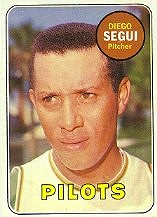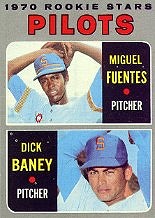
History
 |
After splitting the two game series the Pilots came home to Seattle for the first time. They also came home to an uncompleted stadium. The team management's worst nightmares were coming true. Just the night before the scoreboard was finally up. As the fans entered the stadium before game time, workers were still putting benches in place. Some fans had to wait until three innings to be seated. When all were counted, 17,150 people came to see their team beat the Chicago White Sox.
By the All-Star break the Pilots were hanging into forth place (out of 6 teams in the division), 18 1/2 games behind first place Minnesota. Due to a hamstring injury, Mike Hegan, who was selected as Seattle's representative, had to bow out. Don Mincher was now to be the Pilots member on the All-Star team in Washington D.C..
During this same time, problems with the construction of a new stadium began to delay the project. Twelve sites were on the commission's list of possible locations and by November of 1968 the Seattle Center was selected. However beginning in April of 1969, a petition was filed by a group called the "Committee to Save the Seattle Center" in an effort to prevent the construction at the Center. The group also wanted to to have the issue put on the November ballot. All during the summer of 1969 this problem was having to be dealt with.
As the heat of the summer went on , the problems of the Seattle Pilots became visible. The team had injuries to key players such as Davis and Hegan plus the pitching began to suffer. By mid-August the club was 48-66 and 20 games behind. There were also problems at the ticket booth. At the beginning of September the team had only brought in 588,484 fans. This was an average of 8,407 people per game and they needed to bring in 220,000 with 11 home games left to break even. This was an average of 20,000 per game wish they had only done twice before.
 |
Rumors began to run through Seattle that the team was heading out before the season ended. The fans really were not to blame for the lack of attendance. Sick's stadium was built in 1938 for a minor league team. For a major league club it was not a proper home. The added seats were did not have the best view, tickets were too high for the average fan and the water pressure for the restrooms would be near zero when the attendance reached 10,000. Players would have to use the hotel showers after the game because the locker rooms didn't have enough pressure. The Pilots' ownership was offered Milwaukee County Stadium to play in next year plus Dallas Fort Worth offered to let them finish out the current season in Turnpike Stadium (later to be named Arlington Stadium after the Washington Senators moved in 1972). Mayor Miller of Seattle began to worry about the team leaving and issued an ultimatum to the Pilots to come up with a $660,000 letter of credit to cover four years worth of rent and a $150,000 performance bond before noon on September 8th. Thus, if the team left, the city would still receive the rent money they would have expected if the Pilots stayed. The owners offered a $660,000 letter of credit but no bond. The mayor accepted this but the Bank of California would not cooperate and the mayor never would see the letter of credit.
The Pilots complaints about the stadium situation grew louder. This, however, was not the whole truth. The club was quickly running out of money and was trying to cover it up. Miller, the Seattle Mayor, met with an attorney from the American League and agreed to wait two more weeks for asking the City Council to end the lease with the team. League president Cronin flew to Seattle and settled both sides down enough to keep the team from leaving. At a press conference One of the owners, Daley, said "Seattle has one more year to prove itself."
On October 2, 1969, 5,473 Pilot fans, for a season total of 677,944, came to see the season finally against the Oakland A's. They would lose 3-1 and finish the year 64-98, last place and 33 games out of first. One bright spot was Harper who would lead the majors with 73 stolen bases. Little did the city know this would be the last game for the team as the Pilots.